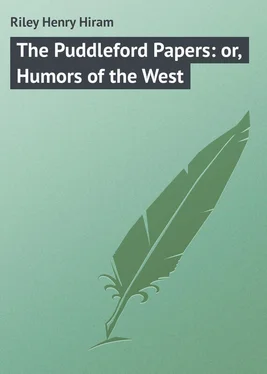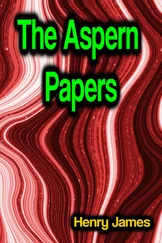Henry Riley - The Puddleford Papers - or, Humors of the West
Здесь есть возможность читать онлайн «Henry Riley - The Puddleford Papers - or, Humors of the West» — ознакомительный отрывок электронной книги совершенно бесплатно, а после прочтения отрывка купить полную версию. В некоторых случаях можно слушать аудио, скачать через торрент в формате fb2 и присутствует краткое содержание. Жанр: foreign_prose, foreign_humor, на английском языке. Описание произведения, (предисловие) а так же отзывы посетителей доступны на портале библиотеки ЛибКат.
- Название:The Puddleford Papers: or, Humors of the West
- Автор:
- Жанр:
- Год:неизвестен
- ISBN:нет данных
- Рейтинг книги:3 / 5. Голосов: 1
-
Избранное:Добавить в избранное
- Отзывы:
-
Ваша оценка:
- 60
- 1
- 2
- 3
- 4
- 5
The Puddleford Papers: or, Humors of the West: краткое содержание, описание и аннотация
Предлагаем к чтению аннотацию, описание, краткое содержание или предисловие (зависит от того, что написал сам автор книги «The Puddleford Papers: or, Humors of the West»). Если вы не нашли необходимую информацию о книге — напишите в комментариях, мы постараемся отыскать её.
The Puddleford Papers: or, Humors of the West — читать онлайн ознакомительный отрывок
Ниже представлен текст книги, разбитый по страницам. Система сохранения места последней прочитанной страницы, позволяет с удобством читать онлайн бесплатно книгу «The Puddleford Papers: or, Humors of the West», без необходимости каждый раз заново искать на чём Вы остановились. Поставьте закладку, и сможете в любой момент перейти на страницу, на которой закончили чтение.
Интервал:
Закладка:
A blue-jay then commenced a loud call from a distant part of the forest. He is one of the birds that lingers behind, and braves the blasts of winter. He was flitting about in a tree-top, and had just commenced his day's work. How gaudily Nature has dressed this bird! How he shines, during spring and summer! All the shades, and touches, and tinges of blue flow over his gaudy mantle; and how orderly and lavishly they are strown over him. But the blue-jay is a dissolute kind of a fellow, after all – "neither more nor less than a thief," Venison says. His shadowy dress fades with the leaf, and after strutting about during the warmer months, making a great display of his finery, he "runs down," at last, into a confirmed loafer. Groups of them may be seen in the winter, drudging around among the withered bushes, and scolding like so many shrews.
Then out popped the little gopher , that finished piece of stripe and check, that miner, who digs deep in the ground. He, too, had left his mansion, and come to greet the morn. A troop of quail marched along, headed by their chief. Who does not love the quail? She is associated with early childhood and household memories. Her voice rings through the past. We heard it sounding over our better years. What a rich brown suit she wears, cut round with Quaker simplicity! what taste and neatness about it! It was she that long ago went forth with the reapers, and piped for them her sunrise psalm, " More wet! More wet! " and she will stay here with us during the winter, and traverse, with her caravan, all day, the desert wastes of snow. Venison says he "don't never kill a quail – it ain't right – but he don't know why."
The partridges, all around, commenced rolling their drums, and every little while, one would whirr past our heads, and die away in the distance. The whole wood-pecker family began their labor. He who wears a red velvet cap, silk shawl, and white under-clothes, was boring away in a rotten tree, to find his breakfast; and he kept hitching around, and hammering, without regarding or caring for our presence. The rabbit, with ears erect, sat drawn up in a heap, quivering with fear, as he gazed upon us.
At last we reached the bank of the river, and Venison said, "We had better sit down, and take our reck'ning." Here was one of the most beautiful pictures of still life ever painted by Nature. The river wound away like a silver serpent, until it was lost in a bank of Indian summer haze, and it gurgled and dashed through the aisles of the forest, like a dream through the silent realms of sleep. It lay, half sunshine, half shadow, and the shadow was slowly creeping up a tall cliff on the opposite shore, as the day advanced, counting, as it were, the moments as they passed. Afar down it, I was amused as I watched a flock of wild geese. They were about a hundred in number, sleeping upon the water, in a glassy cove, their heads neatly tucked under their wings. An old gander, who had been appointed sentinel, to keep watch and guard, was doing the best he could to perform his duty. He stood upon one leg, and he grew so drowsy, several times, that he nearly toppled over, to his great consternation, and the danger of his charge. But rousing up, and taking two or three pompous strides, and stretching his neck to its utmost, with a very wise look, he satisfied himself that all was right, and that he was not so bad a sentinel, after all.
Near by this sleeping community, where a ripple played over a cluster of rocks, a flock of ducks were performing their ablutions. Now they were diving, now combing out their feathers, now rising and flapping their wings, now playing with each other, when the leader blowing a blast on his trumpet, they rose gracefully from their bath, and forming themselves into a drag , went winnowing up the river to their haunts far away.
A sand-hill crane, hoisted up on his legs of stilts, his clothes gathered up, and pinned behind him, was leisurely wading about, spearing fish for his breakfast. A dozy, stupid-looking kingfisher sat upon a blasted limb just over him, looking as grave as a country justice engaged in the same business. A bald eagle came rushing down the stream like an air-ship, his great wings slowly heaving up and down, as if he had set out upon an all-day's journey. A muskrat ferried himself over from one side to the other, urgent upon business best known to himself. A prairie-wolf came down to the water's edge, gave a bark or two, and taking a drink, turned back the way he came.
How many birds had left the wilderness for other climes! The blackbirds, those saucy gabblers, who spent the summer here, feeding upon wild rice, departed a month ago. I saw their bustle and preparation. They were days and days getting ready for their journey. The whole country around was alive with their noise. They sang, and fretted. They seemed to be out of all kind of patience with everybody and everything – to have a kind of spite against Nature for driving them off. All the trees about the marshes were loaded, and some were singing, some complaining, some scolding; but having finally completed their arrangements, all of a sudden they left. And the meadow-lark, that came so early with her spring song – she who used to sit upon the waving grass, and heave herself to and fro, in so ecstatic and polite a manner, as her melody rose and fell – she, too, is gone.
But about hunting bees . Venison informed me that here was the spot where he should "try 'em – that he didn't know nothin' about his luck;" that "bees were the knowingest critters alive" – that they lived in "the holler trees, all around us." He said "they had queens to govern 'em" – that they had "workers and drones" – that "everything about 'em was done just so, and if any of 'em broke the laws, they just killed 'em, and pitched 'em overboard." This, he said, he had "seed himself; he had seed a reg'lar bee funeral." He "seed, once, four bees tugging at a dead body, drawing it on the back, when they throw'd it out of the hive, and covered it over with dirt." And then they have "wars," he says, and "gin'rals," and "captins," and "sogers," and "go out a-fightin', and a-stealin' honey;" they are very "knowin' critters, and there is no tellin' nothin' about 'em."
Venison took the little box he had brought with him, which was filled with honey, and, opening its lid, placed it on a stump. He then rambled around the woods until he found a lingering flower that had escaped the frost, with a honey-bee upon it. This he picked, bee and all, and placed on the honey. Soon the bee began to work and load himself; and finally he rose in circles, winding high in the air, and suddenly turning a right angle, he shot out of sight.
"Where has he gone?" inquired I.
"Gone hum where he lives," answered Venison, "to unload his thighs and tell the news."
In a few moments, three bees returned, filled themselves, and departed; then six; then a dozen, until a black line was formed, along which they were rushing both ways, empty and laden, one end of which was lost in the forest.
Venison and myself then started on a trot, with our eyes upward, to follow this living line; and after having proceeded a quarter of a mile it became so confused and scattered that we gave it up, and returned.
"What now?" I inquired.
"I'll have 'em! I'll have 'em!" he replied. "They can't cheat old Venison. I've hunted the critters mor-nor forty years, and I allers takes 'em when I tries. I'll draw a couple of more sights on 'em."
Venison took two pieces more of honey, and placed one on each side of his box. The bees followed him and commenced their work. Very soon, instead of one, he had three lines established, his line of honey forming the base of a triangle, while the bees were all rushing to its point, on each side of this triangle, and through its middle.
Читать дальшеИнтервал:
Закладка:
Похожие книги на «The Puddleford Papers: or, Humors of the West»
Представляем Вашему вниманию похожие книги на «The Puddleford Papers: or, Humors of the West» списком для выбора. Мы отобрали схожую по названию и смыслу литературу в надежде предоставить читателям больше вариантов отыскать новые, интересные, ещё непрочитанные произведения.
Обсуждение, отзывы о книге «The Puddleford Papers: or, Humors of the West» и просто собственные мнения читателей. Оставьте ваши комментарии, напишите, что Вы думаете о произведении, его смысле или главных героях. Укажите что конкретно понравилось, а что нет, и почему Вы так считаете.












![O. Henry - Heart of the West [Annotated]](/books/745888/o-henry-heart-of-the-west-annotated-thumb.webp)